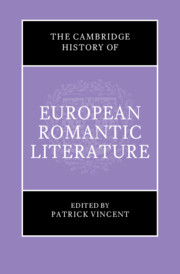Book contents
- The Cambridge History of European Romantic Literature
- The Cambridge History of European Romantic Literature
- Copyright page
- Contents
- Contributors
- Acknowledgements
- Note on the Text
- Chronology
- Introduction
- Part I Romantic Genealogies (1750–1790)
- Part II Revolution to Restoration (1790–1815)
- Part III Restoration to Revolution (1815–1850)
- 14 The ‘Restoration’ of the Restoration
- 15 Late Romanticism and Print Culture
- 16 Global Romanticisms
- 17 No Longer at Ease
- 18 Literatures of the North
- 19 Russian Empire and the Territories of Romanticism
- Further Reading
- Index
17 - No Longer at Ease
The Romantic Novel in Europe
from Part III - Restoration to Revolution (1815–1850)
Published online by Cambridge University Press: 10 January 2024
- The Cambridge History of European Romantic Literature
- The Cambridge History of European Romantic Literature
- Copyright page
- Contents
- Contributors
- Acknowledgements
- Note on the Text
- Chronology
- Introduction
- Part I Romantic Genealogies (1750–1790)
- Part II Revolution to Restoration (1790–1815)
- Part III Restoration to Revolution (1815–1850)
- 14 The ‘Restoration’ of the Restoration
- 15 Late Romanticism and Print Culture
- 16 Global Romanticisms
- 17 No Longer at Ease
- 18 Literatures of the North
- 19 Russian Empire and the Territories of Romanticism
- Further Reading
- Index
Summary
Chapter Seventeen provides an ambitious synthesis of many of the concepts and authors addressed earlier in the volume in order to argue for two intertwining genealogies of modern fiction: on the one hand, the historical and social novel, and on the other, the Gothic, fantastic tales, and other non-realist literary forms. All these genres and forms encode questions of uneven development and often also express a sense of historical and epistemological disorientation. The chapter opens with examples of crossovers between fiction and other artforms to show the rich variety of forms and their influence on European culture. It then looks at cross-border influences and on individual nations’ different material conditions. Romanticism inherited and transformed a series of existing forms and themes, including travel literature, the epistolary novel, the Gothic, and the picaresque, into new forms, including the Bildungsroman, the fragment, the tale, and novella. These reflect an intense self-consciousness regarding historical time and place, even when they appear most ahistorical.
- Type
- Chapter
- Information
- The Cambridge History of European Romantic Literature , pp. 516 - 548Publisher: Cambridge University PressPrint publication year: 2023

